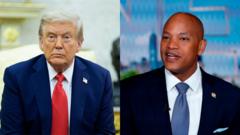In a surprising turn of events, a brief ban on wigs, hair extensions, and skin-lightening products at Dakar’s iconic Grand Théâtre de Dakar caused a significant public outcry, revealing acute tensions surrounding identity, gender issues, and cultural nationalism in Senegal. Issued by Serigne Fall Guèye, the theatre's director and an influential figure in the ruling party, the ban aimed to promote Pan-African values and the institution's cultural integrity. However, backlash ensued as critics labeled the directive a means of controlling women's bodies masked as a quest for cultural pride, leading to a swift reversal the next day.
Feminist organizations and society figures decried the memo, demonstrating concerns about gender disparity in government, evidenced by the disproportionately low representation of women among President Bassirou Diomaye Faye's cabinet and the recent removal of the Ministry of Women. Outrage on social media was rampant, with many condemning the move as sexist and overly paternalistic. Guèye’s political history with the ruling party, known for its anti-colonial stance, added complexity to the situation, with apprehensions that his ideology was infiltrating what is meant to be a nonpartisan public institution.
Political analyst Fatoumata Ba emphasized that the issue transcends mere appearance: it represents a struggle for power and a vision of identity that marginalizes dissenting opinions. A salient voice in the discourse, feminist analyst Henriette Niang Kandé, questioned the rationale underlying the ban, arguing for the necessity of personal choice in aesthetics and labor considerations. While a small group defended the ban as a gesture of cultural pride, Guèye stood behind his belief in restoring African dignity through the arts, condemning the dominance of Eurocentric beauty standards.
Despite the attempt to navigate these complex currents of identity, critics warned against equating cultural authenticity with external appearances while neglecting profound systemic issues. Mame Diarra Thiam, a sociologist, insisted on broader steps for affirming African identity, such as reforming language and economic policies rather than simply prohibiting cosmetics.
Ultimately, Guèye backtracked swiftly, attesting to public miscommunication while committing to the theatre's foundational mission—though the fallout suggests a rising tension among progressive youth and civil society who are increasingly disillusioned with the government’s conservative stance. The theatre's wig ban spurred essential discussions over the definition of cultural authenticity, revealing broader societal challenges intertwined with post-colonial identity, economic realities, and women's autonomy in Senegal. For now, the ban has been lifted, but the conversations it ignited remain urgent and ongoing.



















